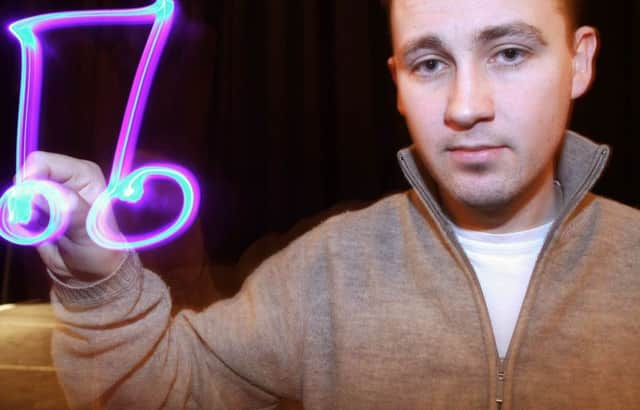Stuart MacRae on creating music from a WW1 poem


Where music is concerned, that’s already proved to be the case in a new work written by the Edinburgh-based composer Stuart MacRae. Parable, his setting of Owen’s poem The Parable of the Old Man and the Young, will be performed by the Hebrides Ensemble, with singer Marcus Farnsworth, in Glasgow (10 February), Edinburgh (11 February), Perth (12 February) and Gateshead (13 February) as part of its programme The Lads in their Hundreds, a commemoration of the era surrounding the outbreak of the Great War.
What makes the entire programme so interesting is its circumnavigation of the principal focus. There are other direct 1914-18 links in Debussy’s response to the fall of Belgium at the start of the war, his lullaby for a hero Berceuse Héroique, and in George Butterworth’s Six Songs from a Shropshire Lad - nostalgic and pastoral, but depicting predictive grey clouds in the song that gives the Hebrides programme its title (Butterworth was also to die in action).
Advertisement
Hide AdAnd in Ned Rorem’s settings of Walt Whitman, War Scenes, there are Owenesque parallels in words that depict the futility of the American Civil War.
More subliminal are the inclusions of Webern’s Chamber Symphony, arranged by Schoenberg, the man whose challenging new serial techniques of the 1910s threw the established musical order into chaos, and Stravinsky’s Three pieces for solo clarinet.
When Hebrides artistic director and cellist William Conway approached MacRae about setting a text for the occasion, MacRae’s immediate instinct was to find a text written by someone with direct experience of the war. “I wasn’t so keen on setting words by someone more recent looking back,” he explains. “So I looked through quite a lot of poems, and also looked at a lot of first-hand accounts. But the poem I kept coming back to was Owen’s Parable of the Old Man and the Young.
What attracted MacRae was the dramatic potential – a story that begins by recounting God’s commandment to Abraham to sacrifice his son Isaac on the altar, but which twists the angel’s offer of reprieve, accepted by Abraham when he slays the lamb instead, with Owen’s dagger blow alternative: “But the old man would not so, but slew his son, and half the seed of Europe, one by one”.
“It’s at that point that you suddenly become aware that Owen is comparing Abraham to the people who took the countries to war. Isaac is the embodiment of the young people called to fight in it.” says the composer. “It’s a fascinating poem, because up to that point it puts you at a distance, draws your guard down. You’re not thinking about war.”
MacRae, whose most recent commissions include such dramatic works as his short opera Ghost Patrol, again with a questioning stance on war, describes the process of translating the poem into music as something that “effectively wrote itself”. “The text has a natural rhythm, so for the most part I kept to that natural, lilting rhythm.”
Advertisement
Hide AdThe other obvious inspiration came from the characters who speak in the poem – the narrator, Isaac and the Angel. “The only one who doesn’t is Abraham, so I decided to find a slightly different way of using the sung voice for each character, so that effectively one singer could embody all three characters.”
Enter Marcus Farnsworth, a unique dramatic performer whose vocally animated performances of Peter Maxwell Davies’ nerve-jangling Eight Songs for a Mad King a year ago with the Hebrides, particularly impressed MacRae.
Advertisement
Hide AdBut what of the role of the instrumental ensemble – the standard Hebrides set up of flute, violin, clarinet, cello and piano? “They provide the commentary and context,” he says. “Some of what they do is directly inspired by the words of the poem, referring to things like wood being split, or the crackling of a fire. I wove these into the fabric of the music, but they become purely musical elements, not simple sound effects. Most of all I wanted to preserve the clarity of the poem. This is music theatre designed as a concert piece.” Again he cites Maxwell Davies as an inspiration.
Like Owen, MacRae’s intention as composer is never to ram his views down people’s throats. “My interpretation of Owen’s poem is that it is absolutely anti-war, and that’s a position I agree with myself,” he explains. “What is so powerful about Owen’s text is that he wrote it while actively involved in a war in which he lost his own life. The thing is to get people to engage with the ideas, to think about them and draw their own conclusions.”
Which was something Benjamin Britten did very successfully in his War Requiem, in which he juxtaposes the text of the traditional Latin Requiem Mass with words by Owen, including the same poem MacRae has set. “I didn’t realise that poem was in the War Requiem when I started setting it,” he admits. “In any case that would have been a distraction and I wanted to respond freshly, so even when I did discover it I avoided looking at the Britten. But I might do that now.”
• Stuart MacRae’s The Parable of the Old Man and the Young forms part of the Hebrides Ensemble’s the Lads in their Hundreds programme at Glasgow University Chapel, 10 February; Queen’s Hall, Edinburgh, 11 February; Perth Concert Hall, 12 February and The Sage, Gateshead, 13 February. www.hebridesensemble.com